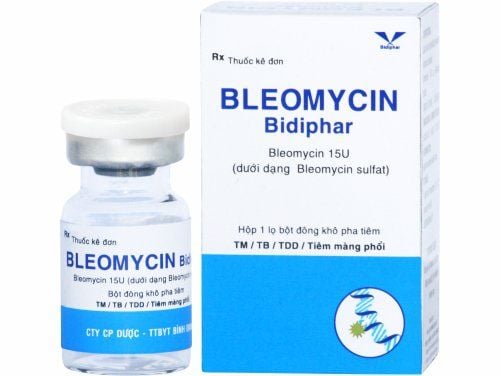This is an automatically translated article.
The article was consulted with Dr. Le Ngoc May - Internal Oncologist - Cancer Center - Radiation Therapy - Vinmec Times City International Hospital.Tongue cancer usually develops from squamous epithelial cells on the surface of the tongue. The most noticeable sign of tongue cancer is a sore that won't heal on the tongue and is painful. Therefore, you should see a doctor if these symptoms persist along with other abnormalities in the mouth area.
1. The relationship between oropharyngeal cancer and tongue cancer
Cancer can develop in 2 different areas of the tongue. Tongue cancer that develops in the front part of the tongue, cancer that develops in the back of the tongue (base of the tongue) is called oropharyngeal cancer.Symptoms of oropharyngeal cancer include:
Red or white patches appear in the mouth, on the tongue; Wounds and mouth sores that do not heal; Sore throat when swallowing; There is a feeling of lumpy, entangled in the throat; Tongue pain; Hoarseness; Difficulty moving the jaw or tongue; Neck or ear pain; Tooth loss; Painful swelling of the oropharynx for more than 3 weeks without improvement; Abnormal mass in the mouth; Dentures no longer fit the mouth the way they used to. Many of the early symptoms of oral cancer can be difficult to detect, so people at high risk (such as smokers or alcohol abusers) should be on the lookout for abnormalities and get regular checkups so they don't give up. omission.
Trắc nghiệm: Bạn có hiểu mọi "ngóc ngách" về miệng mình không?
Hiểu rõ về sức khỏe răng miệng rất quan trọng vì vệ sinh răng miệng không tốt có thể dẫn đến sâu răng, bệnh nướu răng và các biến chứng khác. Sức khỏe răng miệng cũng có thể ảnh hưởng đến sức khỏe tổng thể của bạn. Cùng tìm hiểu sự thật đằng sau những lầm tưởng phổ biến về nha khoa để bạn biết cách chăm sóc răng miệng của mình tốt hơn.
Bài dịch từ: webmd.com
2. Symptoms of tongue cancer
The most common type of tongue cancer is squamous cell carcinoma. Squamous epithelial cells have a thin, flattened form, located on the surface of the skin and tongue, in the lining of the digestive system, respiratory system, mouth, throat... The basic symptoms of tongue cancer are very painful tongue and ulcers. Other symptoms include:Jaw or throat pain; Pain when swallowing; A feeling of entanglement in the throat; Stiff tongue or jaw; Difficulty chewing or swallowing food; Red or white patches on the lining of the mouth or tongue; Non-healing tongue sores; Loss of sensation in an area in the mouth; Bleeding tongue for no reason; Abnormal mass on the tongue that does not go away on its own. Early signs of tongue cancer may cause no symptoms. If the above symptoms appear, it does not necessarily mean that you have tongue cancer or that you have cancer but another type of mouth cancer.

3. Causes of tongue cancer
The cause of tongue cancer is still unknown. However, some risk factors can increase the risk of cancer such as:Smoking; Alcohol abuse; A diet low in fruits and vegetables but high in red meat and processed foods; Human papillomavirus (HPV) infection; Family history of cancer of the tongue or mouth; Previous cancer, especially squamous cell carcinoma of other sites. Men aged 50 and over are the most at-risk group. Smokers and alcoholics are 15 times more at risk than other people.
Other risk factors include:
Gastroesophageal reflux disease (GERD) ; Chewing betel nut; Exposure to certain substances such as asbestos, sulfuric acid and formaldehyde; Poor oral hygiene or factors affecting the mouth.
4. How is tongue cancer diagnosed?
People who suspect they may have tongue cancer should seek medical attention as soon as possible. To determine, the doctor will take personal and family history, examine the mouth - tongue or lymph nodes, if necessary, may order a biopsy. If the biopsy results confirm cancer, the doctor will order additional computed tomography or magnetic resonance imaging (MRI) to see if there has been metastasis.5. Is tongue cancer curable?
Tongue cancer is treatable, and the prognosis is better for those found early. Those who do not have metastases have a higher survival rate. The 5-year survival rate is 78% without metastasis and 39% with metastasis.6. Prevention of tongue cancer
There is no way to completely prevent tongue cancer from developing. However, if you notice any of these signs, seek medical attention as soon as possible. The earlier it is detected, the better the treatment and outcome.To reduce the risk of tongue cancer , some lifestyle behaviors can be changed such as:
Quit smoking; Quit chewing betel nut; Eliminate or limit alcohol intake completely; A healthy, balanced diet rich in green vegetables and fruits; Practice good oral hygiene: Use dental floss, brush your teeth regularly, visit regularly; HPV vaccination ; Practice safe sex and use a diaphragm during oral sex.

7. How is tongue cancer treated?
Usually, patients with tongue cancer will need surgery to remove the cancerous tissue. In uncomplicated cases, the tumor is small, the patient may only need one surgery, however, if the cancer is large, or has spread widely, more complicated surgery is required, and may require several times. surgery. It will even have to have part of the tongue removed. Although as much healthy tissue can be preserved, after surgery, the ability to speak, breathe, eat, and swallow may be affected. In addition to surgery, patients may need more chemotherapy or radiation therapy to remove as much of the remaining cancer cells as possible.8. Prognosis of Tongue Cancer
The prognosis of tongue cancer depends on the stage of the disease as well as on the outcome of treatment. According to statistics, 83.7% of patients with stage 1 oropharyngeal cancer will survive for 5 years, but when there is metastasis, this rate is only 39.1%.Currently at Vinmec International General Hospital, there are General Health Checkup and Cancer Screening services, helping customers to detect health abnormalities. From there, doctors can advise as well as perform other in-depth examinations if necessary, to offer optimal treatment options and prevent serious progression.
Please dial HOTLINE for more information or register for an appointment HERE. Download MyVinmec app to make appointments faster and to manage your bookings easily.
Article referenced source: medicalnewstoday.com













